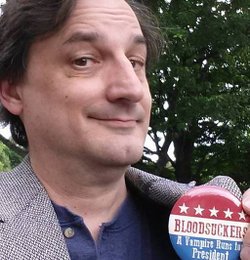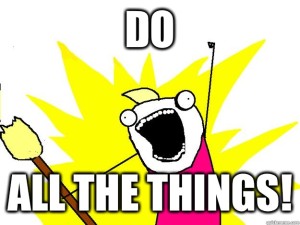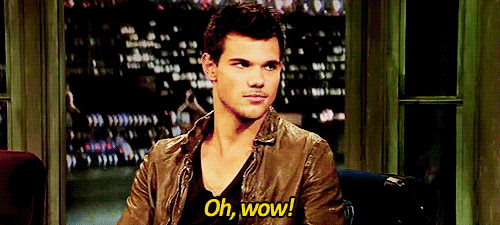 If you have been listening to the podcasts, you may have heard that I’ve got a few ideas percolating in the brain. This week, with the close of the summer rapidly approaching, I’m looking at the following projects:
If you have been listening to the podcasts, you may have heard that I’ve got a few ideas percolating in the brain. This week, with the close of the summer rapidly approaching, I’m looking at the following projects:
- Various short stories for the final season of Tales from the Archives
- A novella for a special collection of science fiction, available only at RT 2016
- A new fantasy epic, co-written with Pip
- The fifth novel in the Ministry of Peculiar Occurrences series
- An urban fantasy novel (that has been sitting on a back burner for WAY too long…)
These works-in-progress are just that: in various stages of progress. That sounds impressive, doesn’t it? Five projects, and today I got an invitation from this guy…
That Ventrella…I got to keep an eye on him. He’s got that “look†about him, you know?
Anyway, you hear a lot about Writer’s Block but rarely do you hear about Writer’s Diarrhea. (I’m not really crazy about this analogy either, but it’s the only thing I got, okay?) You’ve got project upon project, and suddenly you are at the point where I find myself presently. It’s not what you want to work on but more about what you need to work on. This may seem like an easy call to make but if any of these projects-in-progress carry multiple deadlines, the decision process gets a little trickier.
And here’s the thing about us crazy, kooky creative types: we love to do a lot of things at once. It makes us feel productive. It makes us feel accomplished. It makes us feel alive. The problem comes in when you can’t make a deadline, and poor organization can lead to missed delivery dates which can lead to a reputation of commitment but not coming through on your promises. Falling back on “I am so poorly organized…†really is a lame-ass excuse, too. If you want to get organized, you’re going to have to nut up and take control of your projects before your projects take control of you; or start controlling you more than how they are currently.
So, time to nut up, my fellow creatives.
Prioritize Your Projects. This is where you have to begin your organization and, if needed, commitment purge. You’ve got a lot of projects all screaming for attention, but what’s delivery dates on these projects? Which one is due first? Which one is a paying project versus a project of passion? Which title requires more focus versus the projects that seems to flow naturally? Prioritizing isn’t just about “which one comes first†but it is more about which project can make its deadline with the quality and consistency that you, as a professional, are known for.
Set realistic goals for yourself. No one knows your own abilities better than you. This is why you’re going to be dining on disappointment when your average daily word count is two thousand words but you have temporarily—in order to be more efficient—set your daily goal for five thousand words. Accept your daily average and stick with it. This way, if you have a moment’s inspiration and tear through your daily word count, you won’t feel too terrible when you have those times when you struggle and can barely reach five hundred words.

Yeah, you’re going to have days like that. Unless you’re the last son of Krypton, it’s gonna happen.
Set up a realistic editorial calendar. So I have all these projects in the works, right? Well, I didn’t mention that I’m still producing two podcasts, and I’m waiting to hear word on a paying video project. This is, as you can imagine, going to have an impact on the writing schedule; but if I set up an editorial calendar, and I stick to it, I can still continue to make headway with my other titles-in-development as well as make time for this freelance video project and both The Shared Desk and Tales from the Archives. Make Monday and Wednesday your night to work on “Project A†while Tuesday and Thursday “Project B†will be the priority. Or, if you have some time between deadlines, make Tuesday a “Project B†and “Project C†day.
Accept the Fact You Can’t Do Everything. I really wish I could do all the things, especially when I get a chance to work with people I genuinely enjoy swapping snarky comments on social media with or enjoying a beer alongside at a con, but there are going to be those times when the window of opportunity is locked up, reinforced with bars, and has a cranky alpaca, frothing at the mouth, chained in front of it. Saying “No†is not a bad thing, and just because you say “No†doesn’t mean you will never be approached again. It just means you don’t have the time to really dedicate yourself to this new project at that time. There will be other projects, other inspirations, and other titles where you will be able to share your awesome amongst other awesome. The only alternative is to say “Yes†and offer up a phoned-in effort that might not leave the best impression on people…
Make Time for Yourself. Have a life. Burnout can happen quickly and swiftly if you sink yourself into a project. You can also find yourself in a bubble that can hinder the creative flow in your work. As I’ve written before on this blog, inspiration can come from anywhere. If I start feeling stuck or unmotivated, I find some exercise time helps dislodge ideas. Diving into a quick round on Destiny (but still keeping an eye on the time as moderation matters) also gives me a chance to relax and, if I’m lucky, interact with others. Interaction with the outside world carries a lot of worth and weight in the creative process, so make sure that as you have time allocated for your projects, be sure to have time for yourself, as well.
 So while your mileage may vary on getting things done, this is what I do to make sure I clear the “To Do†list of projects. I don’t take it granted—having too much to do is a great place to be as a writer, until suddenly you’re not accomplishing anything and you find yourself at the end of a year with a bunch of half-completed projects and no real progress on any of them. Maybe you will find an approach here that will propel that title on your desk to completion, or maybe you have a technique of your own that helps you get things done (I’d love to hear it! And you know, I got this Comments section at the bottom of this blogpost…); but organization is not a bad thing at all. With that stereotype of the discombobulated, scatter-brained creative who manages best when surrounded by chaos, I’m here to tell you that a bit of organization goes a long way.
So while your mileage may vary on getting things done, this is what I do to make sure I clear the “To Do†list of projects. I don’t take it granted—having too much to do is a great place to be as a writer, until suddenly you’re not accomplishing anything and you find yourself at the end of a year with a bunch of half-completed projects and no real progress on any of them. Maybe you will find an approach here that will propel that title on your desk to completion, or maybe you have a technique of your own that helps you get things done (I’d love to hear it! And you know, I got this Comments section at the bottom of this blogpost…); but organization is not a bad thing at all. With that stereotype of the discombobulated, scatter-brained creative who manages best when surrounded by chaos, I’m here to tell you that a bit of organization goes a long way.


